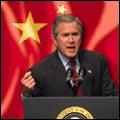LIES OF THE BUSH ECONOMY
This snappy little Flash piece propagandizing the Bush economic record flashed across my desk yesterday. I'm uncertain of its origins, though it does not appear to be connected with the official Bush-Cheney '04 campaign.
A quick survey of right-of-center blogs and other websites shows that Republican-leaners are going ga-ga over this piece as, on its face, it seems to validate what they have long believed, but have never seen substantiated in the public dialogue (most likely because of that pesky liberal media bias): that George W. Bush's economic policies are not a miserable failure and are not a royal screw job for most Americans, but that Bush has done as well as or perhaps better than Clinton.
It's a great, powerful spot. But unfortunately its almost all bunk. The economic "facts" it boasts are either simply not true, disingenuously misleading, or entirely irrelevant. But all of it is disturbing, for it reminds us of the viral characteristics of mis-(or dis-)information. So let me take a crack at it.
GDP:
This spot claims private sector GDP grew 2.5% in the two years before Bush's tax cut and 5.3% after the tax cut. My first question: Which tax cut? There have been successive rounds of tax cuts in each year of Bush's presidency. I have no idea how this foolio is calculating these numbers (if in fact s/he attempted to calculate anything legitimately at all).
I don't know why you would only be interested in looking a private sector growth rates, rather than the growth of the overall economy, unless perhaps you are some market fundamentalist ideologue who thinks government is bad for the economy, and you believe government spending reduces growth even when it is for such economically important public investments as education, transportation and telecommunications infrastructure, basic science and applied R&D, etc. But I can tell that the numbers are not so kosher--their either using nominal figures, not accounting for compound growth rates, or making some other rookie mistake.
So let's assume s/he means one occuring after the first two years, and before the third year. Since the 2004 Q1 GDP numbers only came out today, we're talking about the growth in the economy (private economy) that occured between Jan 1, 2001 and Dec 31, 2002, compared with growth between Jan 1, 2003 and Dec 31, 2003. In real terms, GDP grew $266 billion in the first period (or $150.7 in the private sector). This is a simple total growth of 2.7% (1.9%) or average annual growth of 1.3% (0.9%). In the latter period, real GDP did grow 3.12% (3.07%). This shouldn't be too aurprising because the economy was in recession for most of 2001.
Dividing the periods like this really tells us nothing about the effects of the Bush tax cuts. More importantly it doesn't tell us why or why not Joe Citizen should vote for George Bush. As the Maestro said, (paraphrasing) zero wage growth and strong productivity growth means huge growth in pre-tax profits. Economic growth does not necessarily mean that people's actual living standards are improving.
Which brings us to Jobs:
I've written a lot about this topic, and Job Watch pretty much has this subject covered and debunked. This particular piece touts "500,000 new jobs created in the first three months of 2004." Of course, it says nothing about the more than 2 million jobs lost even after the end of the recession, nor does it tell us what effect the here lauded tax cuts have had on job creation (which, on balance, is a zero to negative-gain, see Job Watch).
Unemployment:
True, after three years the unemployment rate stood at 5.6% in both the Clinton and Bush administrations. Most people get the reason that the unemployment rate is so low under Bush is because so many people have given up looking for work (exiting the labor force) in frustration over the worst job market this country has seen since the Great Depression. Right now there are some 8 million people out of work in this country. If we put back in those phantom unemployed, those who are no longer being counted as unemployed because they are sooo despondent, Bush's unemployment rate jumps up to a whopping 7.1%. YIKES!
Stock Market:
I calculate an increase of 24.7% in the DJIA between April 28, 2003 and April 27, 2004, not the 45% reported in the Flash. Of course, the DJIA only covers 30 out of thousands of stocks. In searching the web for other references to this Flash piece, I found that most postings were dated around March 30, 2004. Fair enough. From March 28, 2003 to March 30, 2004, the DJIA was up 27%.
How about this...Bush came to office as the 1990s stock market bubble was bursting, then 9/11 threw the stock market into a tail spin and the DJIA fell to a way, way low 8,235.81 pts. before climbing back 25% to today's closing price. Then came a wave of corporate accounting scandals beginning with Enron and trickling throughout much of corporate America. The Dow plunged to a low of 7,286.27 on Oct 2, 2002. From this nadir, the DJIA has climbed back 41% to today's price. Now matter how you slice it, the DJIA has not gone up 45% during Bush's presidency.
In any event, I'm wondering why stock prices should be an explicit goal of a president's economic policies rather than, say, the livelihood and living standards of regular Americans...
On that note, I'll wrap up with Poverty:
The average poverty was lower in the Bush reign than under Clinton (9.6 vs 10.5). This is untrue and stupid. It's untrue because the annual poverty numbers are calculated from the March CPS. That means, for example, that the 2001 number is calculated on March 2001, or only a little over a month after Bush took office. It's unreasonable to think that Bush should be responsible for could have influenced the poverty rate in such a short time. So whoever cooked up these numbers is using the wrong endpoints. The Census Bureau only recently released the data for 2002, so there is really only one year of data showing how poverty fared under Bush. If s/he used the right endpoints, the average poverty rate under Clinton would be 9.9% and Bush's would be 9.6%.
It is stupid because who cares what the average poverty rate is over time? The reason we calculate rates is to see the direction of the trend. When Clinton assumed the presidency in 1994, the US poverty rate was 11.6%. After three years, where Bush is now, it had fallen 1.3 percentage points. By the time Clinton left office and Bush usurped the election, the poverty rate had fallen from 11.6% to 9.2%. In the one year of poverty data that is available for the Bush era, the rate increased 0.4 percentage points to 9.6%.
'Nuff said.














